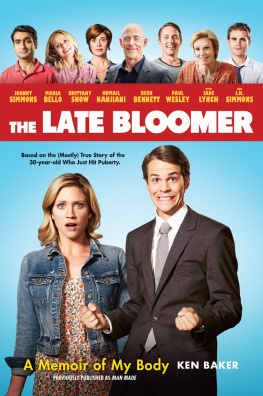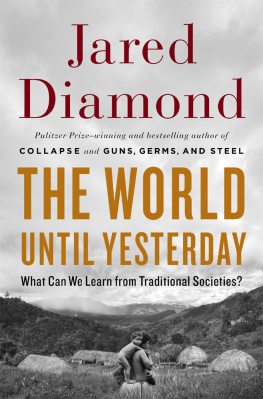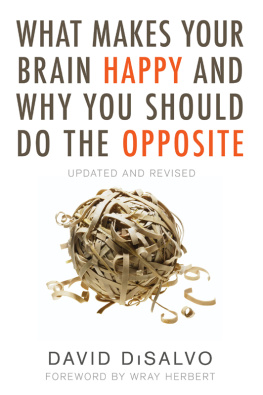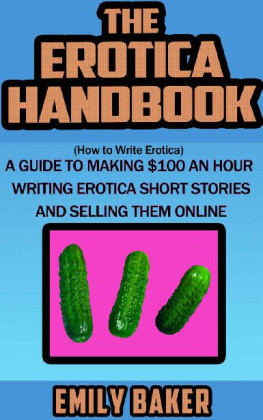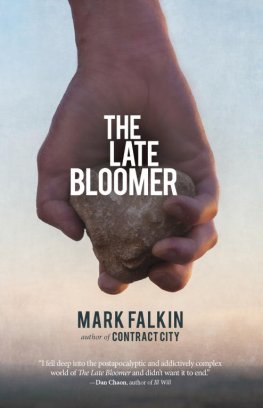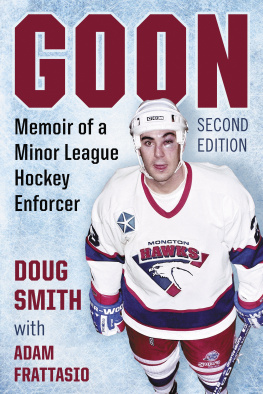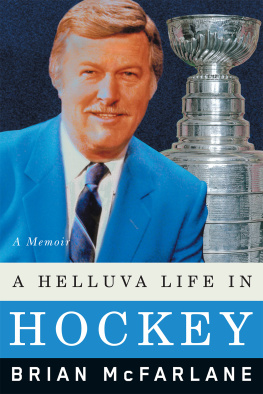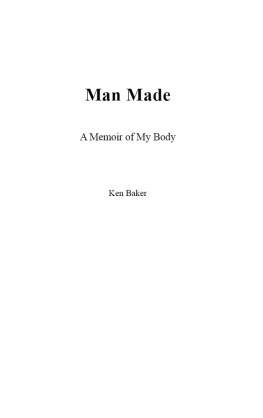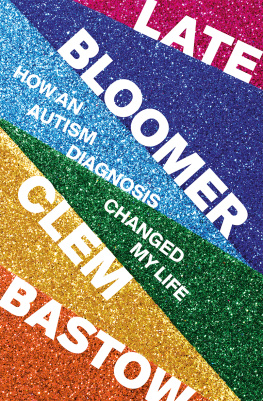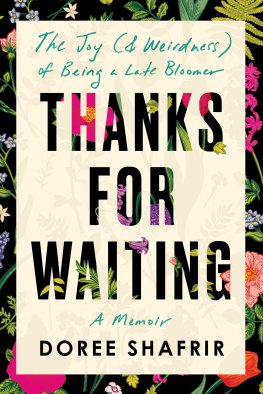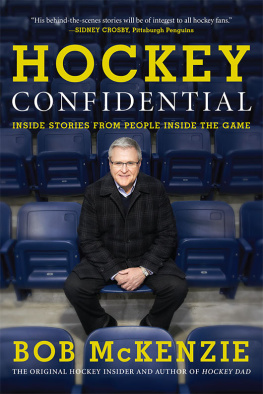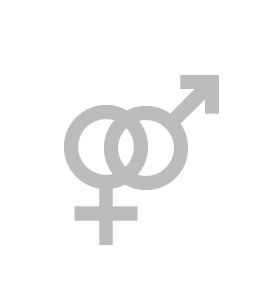Penguin supports copyright. Copyright fuels creativity, encourages diverse voices, promotes free speech, and creates a vibrant culture. Thank you for buying an authorized edition of this book and for complying with copyright laws by not reproducing, scanning, or distributing any part of it in any form without permission. You are supporting writers and allowing Penguin to continue to publish books for every reader.
Tarcher and Perigee are registered trademarks, and the colophon is a trademark of Penguin Random House LLC.
Baker, Ken, date.
Man made : a memoir of my body / Ken Baker.
p. cm.
1. Men. 2. Masculinity. 3. Gender identity. 4. Sex role. I. Title.
Penguin is committed to publishing works of quality and integrity. In that spirit, we are proud to offer this book to our readers; however, the story, the experiences, and the words are the authors alone.
What follows is a true story. The names of certain characters have been changed in order to protect their privacy.
FOREWORD
According to the Buddha, you cant have pleasure without pain. As youll read in this edition of The Late Bloomer, I have suffered plenty of the latter.
But, given the chance for a do-over in my life, would I choose to live without all that tumor-induced pain? No. And its not because I am a masochist (although voluntarily doing a journalism job for the past twenty years that requires chasing around celebrities might suggest otherwise).
I now view my experience as a blessing. I look back on all the pleasures Ive enjoyed since my late twenties rebirthhealth, love, sex, children, a pro hockey adventure, a thriving career, a body simply no longer at war with itselfas karmic reward for my struggle. Regrets? I have a few. Okay, maybe more than a few. But I wouldnt change a thing. I truly mean that. To do so would be spiritually greedy. So far, Ive had an amazing life.
But nobody fights a war without coming back with battle scars. I am still recovering from the trauma of my hormonal health crisis. Yet, just as I set out to do when I first wrote my memoir in 2001, Im as focused as ever on turning that wilting phase of my Early Manhood into potent fertilizer for my ever-blooming Middle Manhood.
Among my most recent pleasures has been seeing my story inspire a moviemore specifically, Hollywoods first-ever brain tumor comedy. Years ago, when a studio executive first told me he envisioned my awkward male misery as a rich source for comedy, I thought he was joking. But the creative twist was nothing short of genius. If laughter is the best form of medicine, then the film adaptation of The Late Bloomer, coupled with the re-release of this memoir, has given me perhaps the ultimate opportunity to heal.
Indeed, what a long, strange, perfectly imperfect trip its been. Enjoy my ride. I have. Mostly...
Ken Baker
Hermosa Beach, California
INTRODUCTION
My body was at war with itself, and on a summer morning in 1998 my brain surgeon brokered a peace agreement. While his steady hand removed a tumor from my skull, it could not halt the haunting, emasculating memories that came rushing forth as I lay recovering under the fluorescent glow of the hospitals intensive care unit. Those memories have allowed me, after spending my entire adult life trapped in a gender netherworld, to finally tell my story.
A little more than two years later, Im sitting in front of the computer in my home office. Reflected in a mirror across the room I see a man from whose head a surgeon cut out a tumor as wide as a chestnut. Though a large tumor, the size wasnt so much the problem as the havoc the clump of cell tissue had been wreaking on my masculinity since I was about fifteen years old. As the tumor grew, my body was flooded with massive amounts of prolactin, a hormone that women secrete to produce breast milk but that men, who possess only trace amounts, dont need at all.
With too much prolactin, a mans testosterone level will plummet. As such, my sex drive diminished; my nipples grew sore and swollen, and they eventually started leaking a milky fluid; my poor muscle tone, from my abs to my legs to my arms, left me feeling soft, ill-defined; I had scant body and facial hair, whiskers that I needed to shave only once every couple months; I suffered near constant pain in my forehead and temples that sometimes forced me to conduct business calls while at home lying in bed with an ice pack on my head. On those rare, anxiety-filled occasions when I worked up the courage to get into bed with a woman, I could not always achieve an erection, the single most cherished male bodily function.
I was so distraught by my deterioration that there were times I would rather have died than live another day as what I perceived as an inadequate, impotent, useless man. My erectile dysfunction (which, in the days before Viagra, I knew only as not being able to get it up) made me cower in the face of sexual expectations and performance pressures. I resented my traditional gender role: sexual aggressor, initiator and virile protector. The more physically attractive the woman, the more I loathed the thought of forcing myself to attempt sex with her. Self-denial and abstinence became my coping method.
In order to exist as a biochemically normal male today, I must take a prolactin-suppressing medicationin the form of a white pill resembling a Tic Tactwice a week, probably for the rest of my life. What will happen if I stop ingesting these tiny yet potent pills? The same hormonal demise I know too well.
Luckily, though, so far the medication is working, and I am a hormonally healthy man. And there are none of the signs of my diseasethe impotence, fatigue, depression, heightened emotional sensitivity, milky nipples, gender confusion, sexual performance anxiety, splitting headachesthat I experienced before I went under the knife. As a result, I am free of the shame and feelings of worthlessness that sexual dysfunction causes in men, and I no longer must carry the additional burden of inflicting the confusion, concern, guilt and self-doubt that my disease created for women I loved.
Ignorant of the prolactin-secreting invader growing three inches behind my eyes and a few centimeters from my brains speech and language center, I dealt with my struggle to be normal as I believed any real man should: I drew a line in the sand and waged a battleagainst an enemy that I mistakenly thought was my own psychological weakness. Blaming my self-regarded pussy-ass disposition on an imagined subconscious reaction to having been raised as an overachieving, hockey-playing son of a hypermacho father in upstate New York, I set out to conquer my sexual demons as a climber would Everest. Like many young men, I had been taught that ones manliness was gauged largely by his ability to overcome adversity. Dad, my brothers, my hockey coaches, the entire culture, passed this myth of manhood on to me. With enough strength and fortitude, so our cultures man-as-hero myth goes, I could be the fisherman in Hemingways

